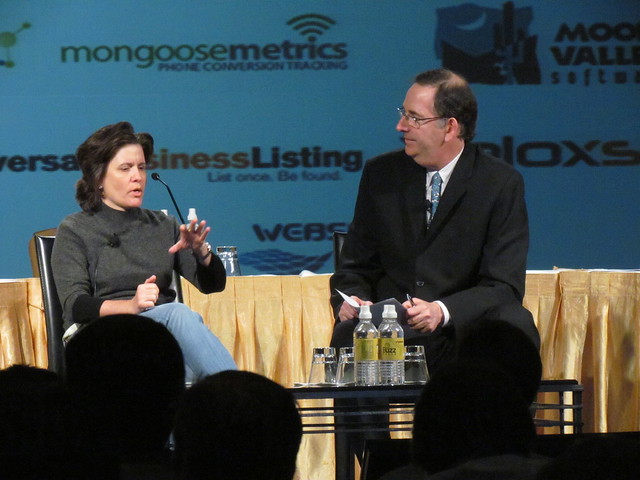ILM West: Kara Swisher on the ‘Vexing Challenge’ of Local

Today at BIA/Kelsey’s ILM West conference, prolific Wall Street Journal tech blogger Kara Swisher acknowledged many of the challenges for local media, but was quick to point out that none of these is new.
Some of the sleeping giants moving more and more into local — like Facebook, eBay and Amazon — she argues aren’t sleepers at all: They’ve been in local for a while. This is true, generally speaking, in that they compete with local businesses like retailers and book stores.
Google is also owning a great deal of local but that shouldn’t be discouraging for smaller or newer players, she argued. Google has had a dicey relationship with companies like Yelp, from which it scrapes content (some argue by shady means), and which it attempted to acquire.
“Google isn’t going to be good at everything,” she said, pointing to their nascent efforts in mobile as well as deals (Google Offers, etc.) and social. These haven’t been sewn up by Google by any means and they will still aquire (or “aquihire”) lots of companies to boost these efforts.
Groupon is likewise feeling its way in local, which she likens to “herding cats” — a very apt metaphor for local sales which are fragmented, small and many (low margin/high volume). Deal flow and fatigue are also challenges, when you get 16 deals per day but only buy one per year.
One interesting trend she points to are the tech companies seeing the most success correlating to founders still running things. The founders’ vision is present, and can be seen in Google, Amazon, Facebook, Yelp, Foursquare, Oracle and until recently Apple.
Echoing points continually made by us and mostly everyone else in the world, mobile opens up the biggest growth areas for local. This comes down to the device portability and personalization, having retailers know you and your loyalty the moment you walk in the door.
This gets into check-ins, something she doesn’t do but appreciates that as they become more “automatic” (i.e., Foursquare Radar), there are ways to algorithmically facilitate loyalty. Lots of this comes down to how much you decide to share, a key point for privacy.
“There are lots of different versions of this same idea,” she said. “Let the social graph know your behavior and give someone the opportunity to reward that. You should be able to let them know what you want them to know, get benefits from that and then make choices.”

